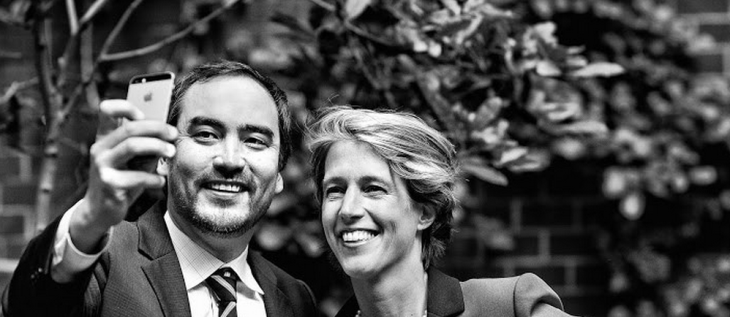Tim Wu, an academic known for his work on net neutrality, is campaigning to become the Democratic nominee for the lieutenant governor of New York.
He’s an unlikely politician. Cerebral, soft spoken, and willing to speak freely, conversation with Wu is a far cry from the stilted, shrill dialogue that makes up most of our modern political discourse.
As next month’s primary election approaches, Wu faces a lawsuit aimed at unseating his candidacy, along with the candidacy of his running mate Zephyr Teachout.
Robert Duffy, the current lieutenant governor of the state, is not seeking another term, pitting Wu against a fellow non-incumbent for the nomination. Teachout hopes to become the Democratic nominee for governor.
The Race
TechCrunch caught up with Wu in the offices of Tilt to discuss his bid for the nomination and his views on net neutrality.
Through his campaign, Wu isn’t only working to get himself elected. Instead he wants to broaden the discussion of technology in politics. Or as Wu put it, he is “obsessed with trying to build a platform that touches on a lot of stuff that matters to tech people but never gets any attention in the real world.” That means a set of views on subjects like bitcoin and the upcoming spectrum auction.
The spectrum auction is interesting, given its great importance and minute public profile. The auction will see new airwave space sold to mobile carriers, allowing them more bandwidth to deliver on-the-go Internet and other services. Billions could change hands in the event that the FCC is calling a “once in a lifetime” sale. Haven’t heard of it? You aren’t alone. The rules that the FCC will use would preserve some spectrum for smaller carriers, helping to prevent market consolidation among the largest players.
Interestingly, Wu doesn’t think that his digital platform will cause a turn in the polls. “I don’t think that it will attract a lot of voters,” he told TechCrunch. Instead he intends it to be a model for what a pro-technology candidate would support, perhaps guiding politicians who are less tech-savvy on a more friendly arc. It could, perhaps, help build a more technology-friendly Congressional bloc, better informed than many in the various branches of our government.
Wu is in the news today for launching a Tilt campaign to raise $100,000 to combat a lawsuit aimed at taking his campaign down. Wu isn’t worried about the outcome of the suit; he told TechCrunch that he and Teachout are “going to win it,” before going on to note that even an assured victory would not be cheap.
How is Wu doing in the polls? You can’t tell, because so far there have been none. Still, in Wu’s estimation, the current state of the horserace is “probably about neck and neck.” If Wu wins the nomination, and Teachout doesn’t, Wu would run with current governor Cuomo. Given Wu’s criticism of the current incumbent — his Tilt page calls the sitting governor corrupt — that would be a delicate situation.
Net Neutrality
TechCrunch also spoke to Wu about net neutrality, an issue that he is generally credited with naming in his seminal 2003 paper, “Network Neutrality, Broadband Discrimination.” Net neutrality is the concept that all data on the Internet should be treated equally, regardless of what sort of content it is, or who requested or sent it.
The FCC is currently devising a new set of net neutrality rules after its prior regulatory framework went up in flames earlier this year due to a courtroom loss.
Asked how FCC Chairman Wheeler is faring thus far, Wu said that the former lobbyist is having a “rough roll out” of his proposed rules. That’s fair — the current climate among non-ISP technology companies is decidedly single-voice in opposition to Wheeler’s plan to allow for some form of paid prioritization, which would upend the soul of net neutrality in the eyes of many.
In Wu’s view, support for Title II reclassification of ISPs as utilities is growing. Use Title II is considered to be the stronger of available net neutrality regulatory options, relagating Internet access to the same category as electricity and other general utilities. In Wu’s estimation, regulation might end up split, employing a combination of legal support that includes at least partial use of Title II reclassification
According to Wu, the “golden goose of the American economy is the Internet sector.” Net neutrality matters, in other words. In Wu’s view, going full-Title II is the preferable way to enforce net neutrality.
Broadly Wu appears optimistic that the rules that the FCC will pass in the end will protect net neutrality. We’re a long way from that eventuality.
Additional reporting by Cat Zakrzewski.
IMAGE BY FLICKR USER DIGITAL MEDIA UNDER CC BY 2.0 LICENSE (IMAGE HAS BEEN MODIFIED)
